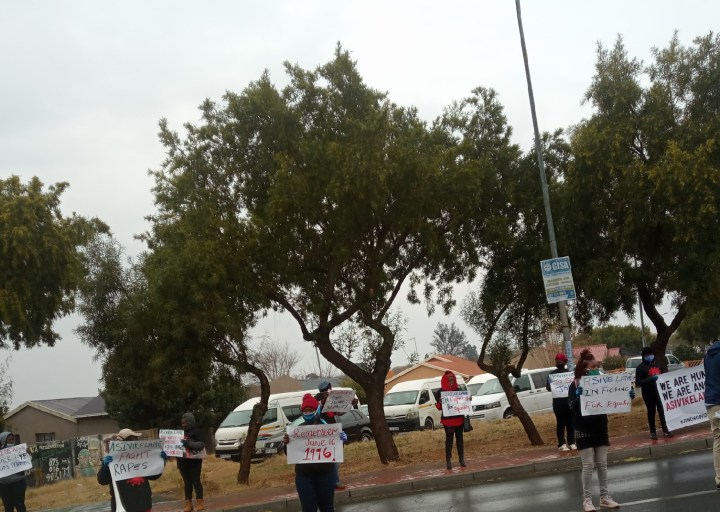Maverick Citizen Op-Ed
Asivikelane! A reflection on June 16 amid Covid-19

This year the historical importance of 16 June 1976 was remembered by some community activists in a way that has been remarkably different because of how the Covid-19 pandemic has restructured our daily realities.
Outside the Hector Pieterson Memorial in Soweto, community activists braved the rain and cold. With banners, T-shirts, toyi-toying, hooting of cars and dancing while raising placards and handing out flyers to passers-by, the message was: “asivikelane!”– “we protect each other” in isiZulu.
The backdrop to the demonstration is that many of the issues that ail society today have been exacerbated by the Covid-19 pandemic – from the wave of police brutality to the alarming increase in gender-based violence. In this context, Asivikelane is an important call of unity, especially with the hunger and anger that has been the general sentiment since the lockdown was pronounced in late March.
It is with these concerns that the Community Organising Working Group (COWG), comprised mainly of community activists, under the C-19 Peoples’ Coalition, organised this campaign.
The campaign took place simultaneously in about 17 localities in Gauteng. At 10.30am, which was the exact time that Hector Pieterson was shot, a moment of silence was observed.
According to community activist Bongani Xezwi, “For what happened in June 1976, we remember the apartheid regime which killed school-going children in their struggle for quality education.
“But what 1976 today is, it is the coronavirus, it is police brutality, it is gender-based violence, the continuous systemic poverty that we are subjected to… that is what we are fighting today.
“The struggle today, more than ever, calls for unity… let us wear masks, maintain physical distancing and celebrate and remember those that passed in the struggle.”
The campaign demonstrated new methods of organising by activists. It was organised both online and offline through WhatsApp and Zoom. The coordination and planning of meetings prior to the campaign was done on WhatsApp and the actual meetings and delegation of tasks that allowed people to talk and air their concerns was done through Zoom.
The seemingly seamless coordination by the activists, some of whom had to learn to use these platforms, was a culmination of several weeks of public education where activists, with the help of volunteers, sensitised communities on preventive measures against Covid-19. This countered the narrative, especially in densely populated informal settlements, that physical distancing could not be practised.
Moreover, in bridging the gap of the digital divide, resources were mobilised to buy data, and assistance was given around the technicalities of using Zoom.
The unity shown by the activists and their willingness to learn went a long way towards the success of the Asivikelane campaign.
The shift to the online sphere was not because of the convenience but rather the urgency of organising across Gauteng at a time when movement was restricted. One of the claims made was, “Asivikelane for free data”.
This was highlighted by the fact that most school-going children could not continue learning during the lockdown when learning shifted online. Issues around the lack of electricity and load shedding were also raised.
An online Zoom rally ended the programme of the day. For many, it was the first time they had attended an online rally. The rally may have lacked the charisma of a “normal” rally, but it highlighted current urgent issues. And with the public still embracing the novelty of Zoom and social movements learning how best to use it, comes the increased blurring between the online and the offline that shapes activism today.
All in all, the call for unity to be able to navigate this pandemic remains vital. Asivikelane! DM/MC
Angela Chukunzira is a scholar-activist based at the Centre for Social Change at the University of Johannesburg.


















 Become an Insider
Become an Insider